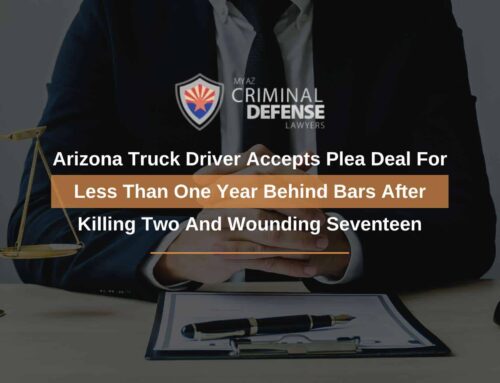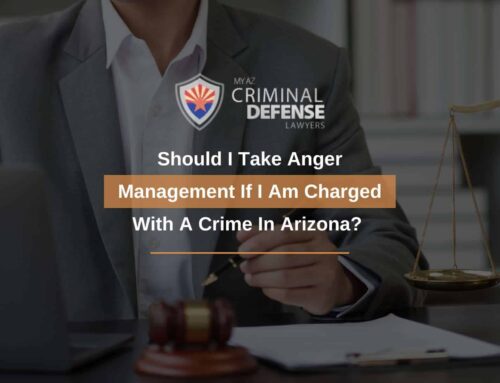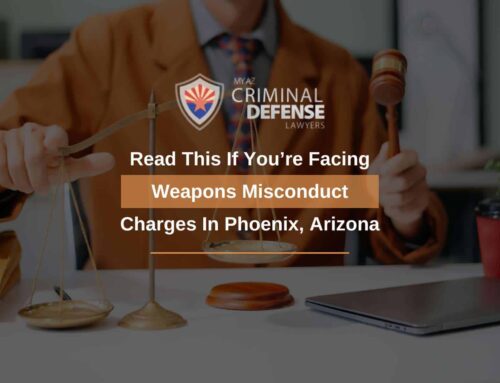Goodyear Man Indicted On Murder Charge After Wife’s Drowning Death Following DUI Crash
Too many people get behind the wheel after having a few drinks thinking, “what’s the worst that could happen?” The answer to that may be causing a traffic accident that results in serious bodily injury or death. On March 22, 2024, Anthony Maiorana was driving home from a baseball game with his wife, Megan Maiorana, in a gated community in Goodyear, Arizona. He drove off the road and collided with a concrete culvert on the front passenger side, which caused the vehicle to propel into water. He was able to escape the vehicle, but his wife was trapped inside and drowned. Rescuers were not able to save her in time, and Anthony Mariorana’s reported blood alcohol content, or BAC, was 0.234%, which is nearly three times the legal limit of 0.08%. Because his driving while extremely intoxicated resulted in his wife’s horrific death, he has been arrested and indicted on second-degree murder charges. He was originally charged with manslaughter, but the charges have since been replaced with second-degree murder, which is a more serious offense in Arizona.
No matter the circumstances surrounding a criminal arrest, a defense attorney can help the defendant make sense of what is going on and work towards a resolution that is in their best interest. If you have been arrested for a criminal offense in Phoenix or Tucson, our experienced defenders can determine your best plan of action and provide skilled legal representation. If you’d like to schedule your free consultation for our services, call 480-833-8000.

Arizona Revised Statutes Section 13-1104
Second-degree murder is defined in Arizona by A.R.S. § 13-1104. The key factor that separates second-degree murder from first-degree murder in Arizona is premeditation, or planning the offense in advance. The three definitions of second-degree murder as set forth by § 13-1104 are:
- Intentionally causing the death of another person, including an unborn child;
- Knowing that the person’s conduct will cause death or physical injury and causing the death of another person; and
- Acting with extreme indifference to human life or reckless disregard for a grave risk of death, causes the death of another person.
Second-degree murder is a class 1 felony. If the victim is under 15 years of age, it is punishable by A.R.S. § 13-705. If the victim is an unborn child, it is punishable by A.R.S. § 13-706.
Class 1 Felony Penalties
A Class 1 felony carries a presumed sentence of 16 years, which can be increased to 25 years or decreased to 10 years for aggravating or mitigating factors. If the defendant has already been convicted of second-degree murder or a felony involving a dangerous offense, the presumptive sentence will be 20 years which can be increased to 29 years or decreased to 15 years for aggravating or mitigating factors.
A.R.S. § 13-705 Penalties
A.R.S. § 13-705 is Arizona’s law for dangerous crimes against children. Per this statute, second-degree murder of a child under 15 years old is punishable by a life sentence behind bars. If the defendant is not issued a life sentence, the presumptive sentence will be 30 years, which can be increased to 35 years or reduced to 25 years for aggravating or mitigating factors.
A.R.S. § 13-706 Penalties
A.R.S. § 13-706 is Arizona’s statute for serious, violent, or aggravated offenders. A defendant convicted of second-degree murder who has already been convicted of two or more serious offenses must serve at least 25 years before they will be eligible for any form of release, including probation or suspension. If the defendant has been convicted of two or more violent or dangerous offenses, they are not eligible for any form of pardon or release until they have served at least 35 years behind bars. Second-degree murder counts as both a serious offense and a dangerous or violent offense for the purposes of this section.
Super Extreme DUI
A DUI offense is serious no matter the level it is charged because in Arizona, DUI defendants are required to complete mandatory jail sentences. However, under these circumstances, even a Super Extreme DUI pales in comparison to second-degree murder charges. A standard DUI, Extreme DUI, and Super Extreme DUI are all misdemeanor offenses in Arizona. Here, the driver didn’t actually meet any of the factors necessary for Aggravated DUI, which is the felony level of DUI for Arizona.
Super Extreme DUI is defined in Arizona by A.R.S. § 28-1382. The minimum jail sentence for a first-time Super Extreme DUI is 45 consecutive days, but all but 14 days can be suspended upon installation of an IID, or ignition interlock device. The minimum fine is $3,250, and the defendant’s driver’s license will be suspended for at least 90 days. If this is a second offense, the minimum jail sentence jumps to 180 days, and 90 of those must be served consecutively.
Why Quality Legal Representation Matters In Dire Situations
There is no moving on from circumstances like these, but failure to fight back against criminal charges could effectively mean the end of the defendant’s life and liberty. While being sentenced to 10 years versus 25 years might still sound life-shattering, the defendant has a better chance of being released and enjoying more of their life after prison when the judge rules on the lighter side of sentencing guidelines. If the defendant’s lawyer successfully argues for lower fines and restitution, the defendant will have less debt to repay upon their release from prison.
The fact that Maiorana was first charged with manslaughter, which was later increased to second-degree murder, demonstrates how prosecution has leeway in a defendant’s judicial fate. A criminal defense attorney might employ several negotiation tactics to plea bargain for manslaughter charges versus second-degree murder charges. However, plea bargaining also involves the defendant pleading guilty to the lesser offense. This would still mean several years in prison with no possibility of being declared not guilty and being released from police custody. Whether or not plea bargaining is a good legal strategy in a defendant’s situation will depend on the evidence that the prosecution has supporting the allegations.
When a defendant’s liberty is at stake, they are entitled to a court-appointed public defender to handle their case. While public defenders are undoubtedly skilled and knowledgeable in Arizona criminal law, they also tend to have a bigger caseload and fewer resources available than private criminal defenders. Factors like these can make a huge difference in the outcome of the defendant’s case- for example, it could be the difference between a few years behind bars and a few decades behind bars.
At My AZ Lawyers, our criminal defense attorneys are seasoned in all stages of a prosecution, from indictment to trial and if necessary, the appeals process. We will fight to achieve the best possible outcomes given our clients’ personal situations. During what is probably one of the most stressful experiences of your life, let us put our experience to work for you. Our attorneys offer free consultations by phone to get the process started. To discuss your situation in detail with an experienced Arizona criminal defender, call 480-833-8000 to schedule your free consultation. Contact us at My Az Criminal Defense Lawyers.

My AZ Criminal Defense Lawyer
Mesa Location:
1731 West Baseline Rd., Suite #100
Mesa, AZ 85202
Office: (480) 448-9800
Glendale Location:
20325 N 51st Avenue Suite #134, Building 5
Glendale, AZ 85308
Office: (602) 509-0955
Tucson Location:
2 East Congress St., Suite #900-6A
Tucson, AZ 85701
Office: (520) 441-1450
Avondale Location:
12725 W. Indian School Rd., Ste E, #101
Avondale, AZ 85392
Office: (623) 499-4222







